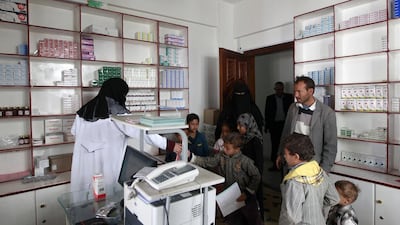TAEZ // Anwar Mohammed Alwan suffers from diabetes and can hardly afford food for his six children, much less buy medicine for himself.
He has no choice but to rely on charities.
"I am a jobless man and I cannot buy medicine but I usually get it from philanthropists and organisations that provide us with medicine for free," Mr Alwan, 46, told The National.
“Some pharmacies in Taez city also provide us with medicines for free but there is no guarantee that I will get medicine for the next month.”
Mr Alwan is one of many patients in Taez and elsewhere in Yemen who depend on international aid organisations or charitable individuals for vital medicine.
To ease that burden, the World Health Organisation sent nine lorry loads of medicines into Yemen at the beginning of May.
But in all the lorries, the medicines – used to treat different diseases, including chronic conditions – were already beyond their expiry date or close to it, Yemeni health officials said.
“The medicines have to be inspected before we distribute them to the patients, so when the lorries arrived from Sanaa we started to inspect them and all of them had already expired or were near to their expiry date,” said Dr Watheq Al Faqeeh deputy head of the health department in Taez province.
He said the medicines were meant to be distributed throughout the whole of Taez province, both to forces loyal to the internationally-recognised Yemeni government and to areas under the Houthi rebels’ control.
But the WHO, which immediately launched an investigation into the incident, said all expired medicines, or medicines close to expiry, had been removed from medical kits in the warehouse before they were loaded onto lorries. It added, however, that some of the documentation accompanying the lorries into Taez had not been updated to reflect this.
“WHO has taken all humanly possible precautions to avoid issuing drugs that are either already expired or near expiry. The medical kits had been checked in the warehouses, and expired drugs and drugs close to expiry had been removed from the kits before the lorries were loaded,” the organisation explained in a statement after the incident, which was published in local media.
“In the WHO’s efforts to quickly supply hospitals in Taez, which are under intense strain, and support them in their efforts to provide adequate health care to the population in need, paperwork relating to one of the eight lorries which was submitted to the health authorities had not been updated to document which items have been removed.”
The WHO also made clear that of the eight lorries carrying medical supplies to Taez province, four of them continued on their journey, transporting 26 tons of medicines to destination hospitals, while the other four lorries destined for Taez city were retained by the health authorities.
The number of lorries used to transport the medicines is disputed. The WHO referred to eight lorries while the Taez health department said there were nine.
Kholood Ahmed, a social worker in Taez city said individual philanthropists were doing more than official or international organisations to help the sick in the province. She accused officials of exploiting people’s suffering to make money by asking for donations but not using them for their intended purpose.
“We hear so much about the work of organisations in Taez but we see little effects. We don’t hear so much about philanthropists and yet we see huge effects,” she said. “I can say that philanthropists are providing more patients with more medicines than any organisations.”
foreign.desk@thenational.ae

